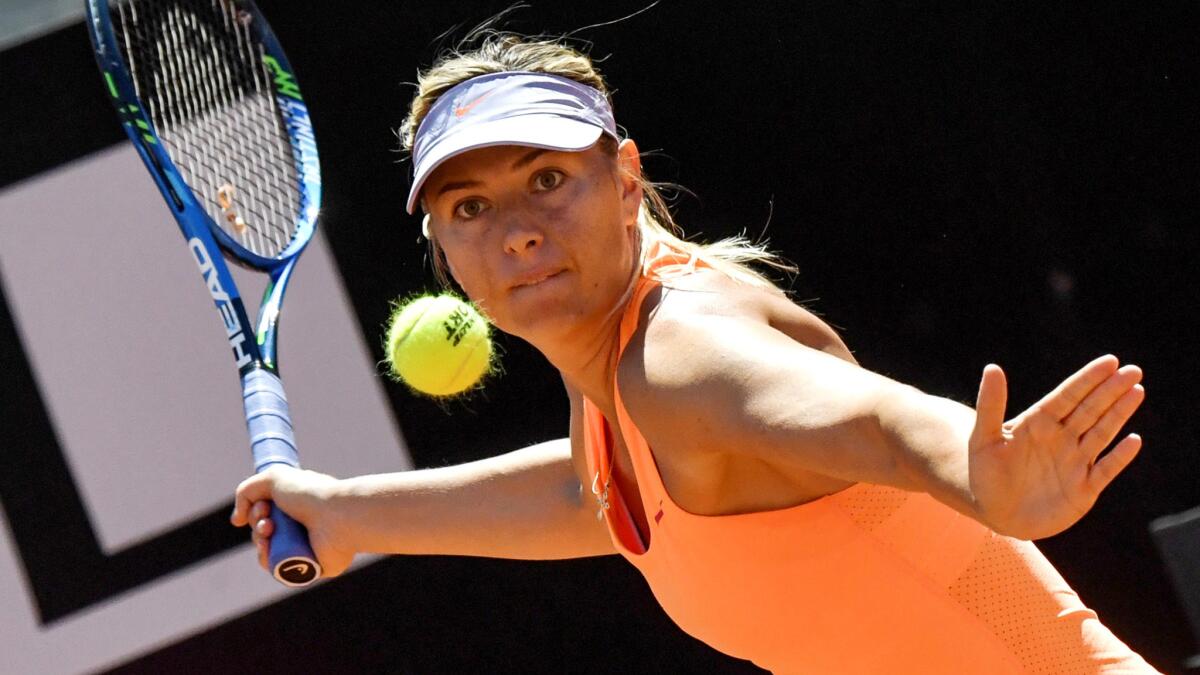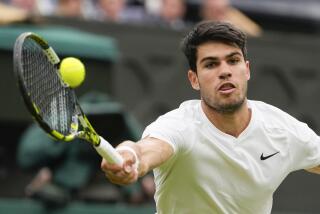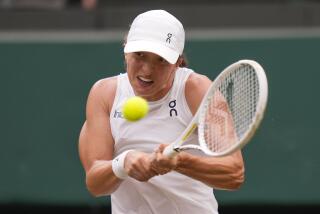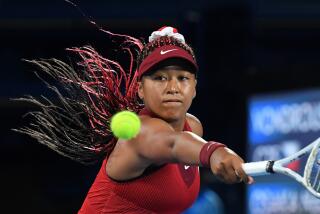Column: With drug ban behind her, Maria Sharapova determined to get career back on track

Reporting from Carlsbad â Maria Sharapova walked out to the court dressed all in white but this clearly wasnât Wimbledon, not with music blasting as fans carried wine glasses toward seats that surrounded a multicolored court.
In actual miles and in the current state of her career the five-time Grand Slam champion was far from the center of the tennis world, where Roger Federer and Garbine Muguruza attended the Wimbledon championsâ ball Sunday night. Sharapovaâs suspension for testing positive for the banned drug meldonium at the 2016 Australian Open ended in April but her comeback ran aground in her third tournament, when she injured a thigh muscle in Rome in mid-May. Her hope of qualifying for Wimbledon vanished when the injury lingered and ended her grass-court season.
For the record:
5:58 a.m. Nov. 28, 2024An earlier version of this column referred to Roger Federer and Garbine Muguruza dancing at the Wimbledon championsâ ball. The two attended but did not dance.
The relaunch of her return began on Sunday in an environment that was friendly and happily unconventional. Sharapova played a set of womenâs doubles and a set of singles for the Orange County Breakers of World Team Tennis against the San Diego Aviators, using the competition at the Omni LaCosta Resort & Spa to launch a journey she hopes will restore her to the top at age 30.
Her throaty grunt was back. So were her serve and some of her shots, though the format made it difficult to gauge her match fitness. Sheâs scheduled to play again on July 24 at the Palisades tennis club in Newport Beach.
âThis is a great little addition to my schedule. I wasnât planning actually on playing World Team Tennis,â she said before the event, which included her 5-3 singles loss to Shelby Rogers in a 17-14 victory for San Diego. âI just thought I could use the bonus matches, as I like to call them, playing in front of a crowd, come back to places Iâve competed at before.â
She made her WTT debut in 2002 at 15, a willowy Russian prodigy. It seems a lifetime ago for Sharapova, whose ranking hit No. 1 in 2005 and again in 2007 and fueled a lucrative endorsement and business career. She was ranked 171st through Sunday.
âComing in and playing these matches is a little bit different than when I was 15 years old. Itâs a nice little tuneup as I get ready to play Stanford in a couple of weeks,â she said. âAnd thereâs nothing like going in front of a crowd, and this is a tournament that Iâve played.â
But some of her rivals have said she shouldnât be playing because of her positive test for meldonium, which increases blood flow and carries more oxygen to muscles.
She had been prescribed the drug â also known as mildronate â well before it was added to World Anti-Doping Agencyâs list of banned substances in 2016. The International Tennis Federation suspended her for two years but the term was reduced on appeal by the Court of Arbitration for Sport, which ruled she had âsome degree of faultâ for taking the drug but hadnât intended to cheat.
Her positive test and ban became a polarizing topic. Some players said she paid a stiff enough price by being suspended; others thought she deserved a longer or permanent ban. Andy Murray was among those who questioned why she was given wild-card entries into tournaments in Stuttgart, Germany, Madrid and Rome after her ban, though her ability to sell tickets was obvious motivation. Canadian Genie Bouchard called her a cheater and said Sharapova should have been banned for good, triggering an awkward meeting at the net when Bouchard defeated her in the second round at Madrid.
That others might disappove of her presence doesnât bother Sharapova, who was warmly welcomed Sunday. âI served the suspension period and I think thereâs not much more that I could add to that,â she said. Asked if she got a fair shake she replied, âThatâs not for me to speak about.â
To compete in the yearâs final Grand Slam â the U.S. Open â she will have to get a wild card or get through qualifying. For the moment, she cared only that she was able to compete on Sunday. âI have to be realistic about the fact that I havenât played in a long time and even before the 15 months I was also injured, so it was almost like a two-year break for me where I didnât compete a lot,â she said. âThe importance and significance of every tournament is much more in my mind than what I can or not do at the U.S. Open.â
Every step toward that goal will reawaken the debate over her drug ban. She doesnât care. âI think I always had the opportunity to say that, as someone thatâs 30 years old, Iâve achieved enough to call it a day, but thereâs something deeper in that for me than just the sport,â she said. âThereâs something that Iâve done all my life and my career. I wanted to continue that and thatâs where my focus is, and not much on else.â
Follow Helene Elliott on Twitter @helenenothelen
More to Read
Go beyond the scoreboard
Get the latest on L.A.'s teams in the daily Sports Report newsletter.
You may occasionally receive promotional content from the Los Angeles Times.










